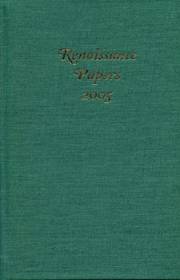Book contents
- Frontmatter
- Contents
- Renaissance Papers
- Bronzino, Castiglione, and A Self-Portrait: Re-evaluating Bronzino's Trip to Pesaro
- Tracing Astrophil's “Coltish Gyres”: Sidney and the Horses of Desire
- Shakespeare's Twins: Choric Juxtaposition
- Rhetoric and Intimacy in The Tempest
- “That Holy roome”: John Donne and the Conduct of Worship at St. Paul's Cathedral
- Conversation in Hutchinson's Order and Disorder and Milton's Paradise Lost
- Dryden on Epicoene's “Malicious Pleasure”: The Case of the Otters
Tracing Astrophil's “Coltish Gyres”: Sidney and the Horses of Desire
Published online by Cambridge University Press: 12 September 2012
- Frontmatter
- Contents
- Renaissance Papers
- Bronzino, Castiglione, and A Self-Portrait: Re-evaluating Bronzino's Trip to Pesaro
- Tracing Astrophil's “Coltish Gyres”: Sidney and the Horses of Desire
- Shakespeare's Twins: Choric Juxtaposition
- Rhetoric and Intimacy in The Tempest
- “That Holy roome”: John Donne and the Conduct of Worship at St. Paul's Cathedral
- Conversation in Hutchinson's Order and Disorder and Milton's Paradise Lost
- Dryden on Epicoene's “Malicious Pleasure”: The Case of the Otters
Summary
AT the start of Philip Sidney's Defence of Poesie (written some time in the early 1580s), John Pietro Pugliano, the Emperor's master of horse, praises horsemanship and horses so compellingly that Sidney says, smilingly, “if I had not been a piece of logician before I came to him, I think he would have persuaded me to wish myself a horse.” We see, he says, the distorting effect of self-love, and offers the reader another example: himself. A poet, he will praise poetry. The paradox Sidney sets up is not quite that of self-reference, although it comes close, but Sidney does place himself in a paradoxically logical if pleasantly sophistical win-win situation. If we believe him on poetry we must respect the avocation into which he has fallen. If, on the other hand, we doubt him because we think his logic distorted by bias he also wins, for the Defence is explicitly designed—so the speaker claims—to show self-love at work. Hearing a poet praise poetry is not too far from hearing Folly praise folly, even if not quite like hearing a Cretan say all Cretans are liars.
Sidney's opening gambit, clever but no mere courtly sprezzatura, is a revealing moment, because behind Pugliano's self-loving praise of horses and horsemanship, as behind the poet Sidney's praise of poetry, lies a defense of desire itself. Horses are ancient symbols of desire, after all, and Sidney's very name—Phil-hip—means “horse-lover.” If horses have often represented libido, though, logic and the superego suggest that even a passionate poet should not want to be one.
- Type
- Chapter
- Information
- Renaissance Papers 2005 , pp. 25 - 42Publisher: Boydell & BrewerPrint publication year: 2006

